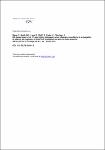NS Reassortment of an H7-Type Highly Pathogenic Avian Influenza Virus Affects Its Propagation by Altering the Regulation of Viral RNA Production and Antiviral Host Response
Wang, Zhongfang
Robb, Nicole C.
Lenz, Eva
Wolff, Thorsten
Fodor, Ervin
Pleschka, Stephan
Highly pathogenic avian influenza viruses (HPAIV) with reassorted NS segments from H5- and H7-type avian virus strains placed in the genetic background of the A/FPV/Rostock/34 HPAIV (FPV; H7N1) were generated by reverse genetics. Virological characterizations demonstrated that the growth kinetics of the reassortant viruses differed from that of wild-type (wt) FPV and depended on whether cells were of mammalian or avian origin. Surprisingly, molecular analysis revealed that the different reassortant NS segments were not only responsible for alterations in the antiviral host response but also affected viral genome replication and transcription as well as nuclear ribonucleoprotein (RNP) export. RNP reconstitution experiments demonstrated that the effects on accumulation levels of viral RNA species were dependent on the specific NS segment as well as on the genetic background of the RNA-dependent RNA polymerase (RdRp). Beta interferon (IFN-β) expression and the induction of apoptosis were found to be inversely correlated with the magnitude of viral growth, while the NS allele, virus subtype, and nonstructural protein NS1 expression levels showed no correlation. Thus, these results demonstrate that the origin of the NS segment can have a dramatic effect on the replication efficiency and host range of HPAIV. Overall, our data suggest that the propagation of NS reassortant influenza viruses is affected at multiple steps of the viral life cycle as a result of the different effects of the NS1 protein on multiple viral and host functions.
No license information
Related Items
Show related Items with similar Title, Author, Creator or Subject.
-
2000-10-01ZeitschriftenartikelLebensmittelassoziierte Virusinfektionen Höhne, Marina; Schreier, EckartBis in die 70er Jahre war die Diagnostik von infektiösen Diarrhöen auf den Nachweis von Bakterien und Parasiten beschränkt, und auslösende Erreger konnten nur in einigen Fällen ermittelt werden. Verbesserte Nachweismethoden ...
-
2015-06-19ZeitschriftenartikelIn Silico Prediction and Experimental Confirmation of HA Residues Conferring Enhanced Human Receptor Specificity of H5N1 Influenza A Viruses Schmier, Sonja; Mostafa, Ahmed; Haarmann, Thomas; Bannert, Norbert; Ziebuhr, John; Veljkovic, Veljko; Dietrich, Ursula; Pleschka, StephanNewly emerging influenza A viruses (IAV) pose a major threat to human health by causing seasonal epidemics and/or pandemics, the latter often facilitated by the lack of pre-existing immunity in the general population. Early ...
-
2015-11-10ZeitschriftenartikelComparison of the Cowpox Virus and Vaccinia Virus Mature Virion Proteome: Analysis of the Species- and Strain-Specific Proteome Döllinger, Jörg; Schaade, Lars; Nitsche, AndreasCowpox virus (CPXV) causes most zoonotic orthopoxvirus (OPV) infections in Europe and Northern as well as Central Asia. The virus has the broadest host range of OPV and is transmitted to humans from rodents and other wild ...

